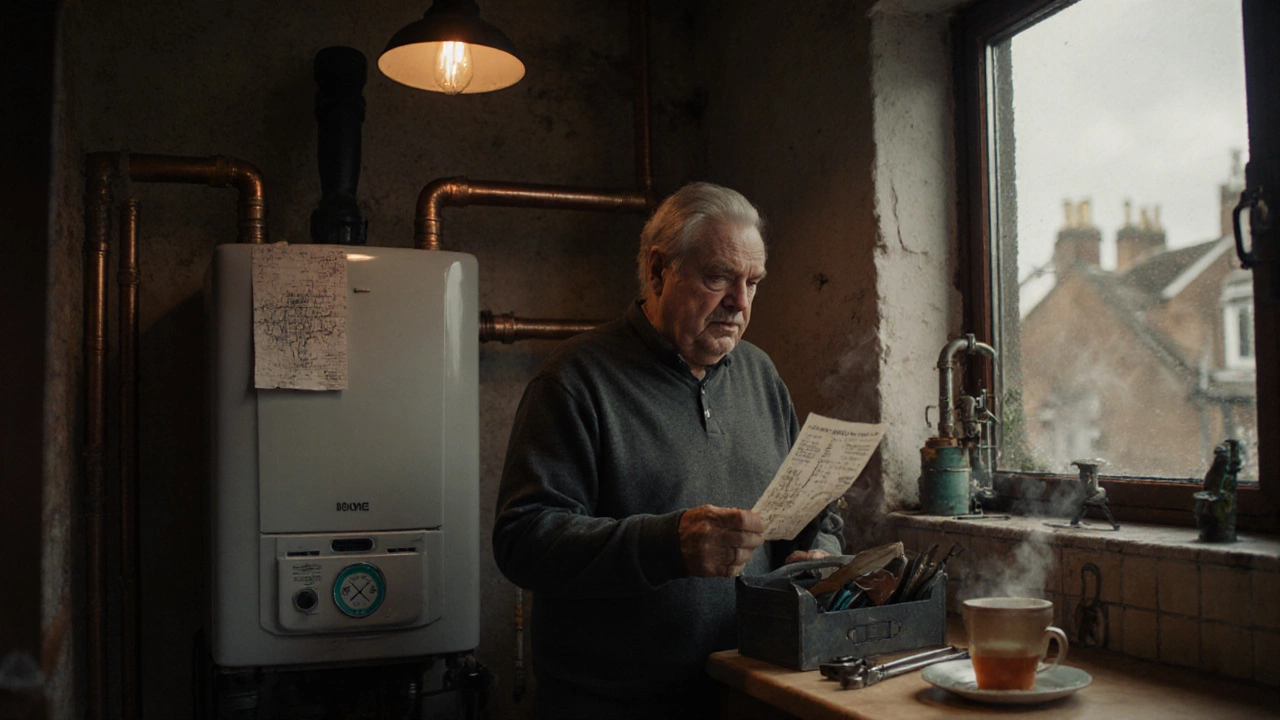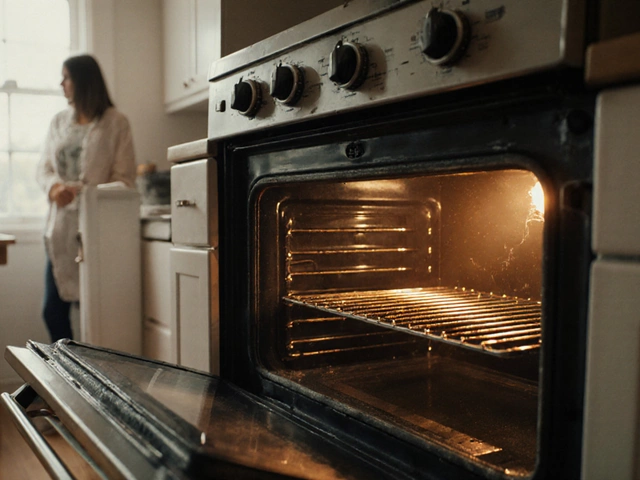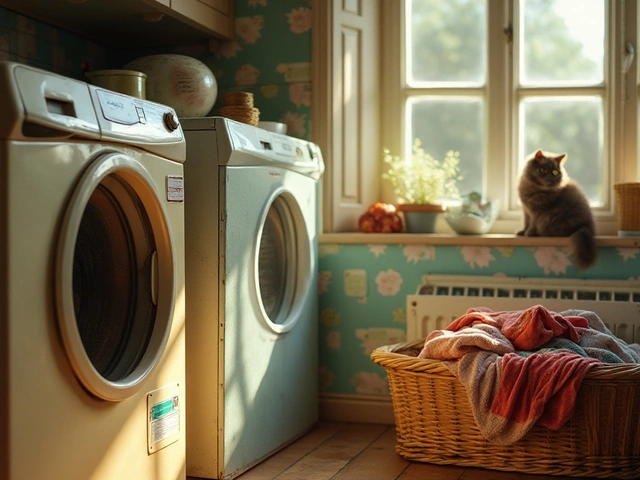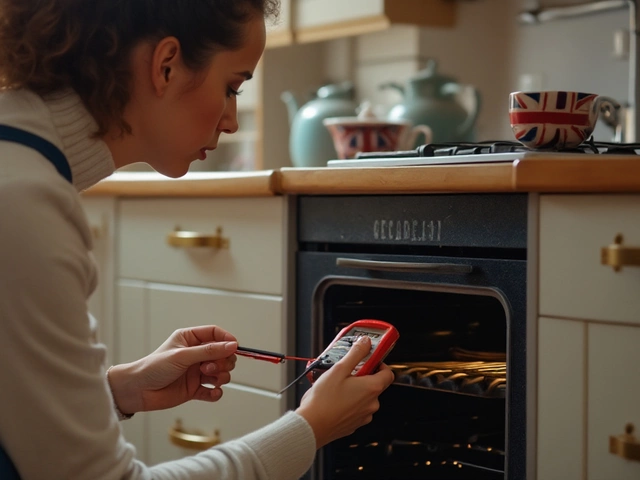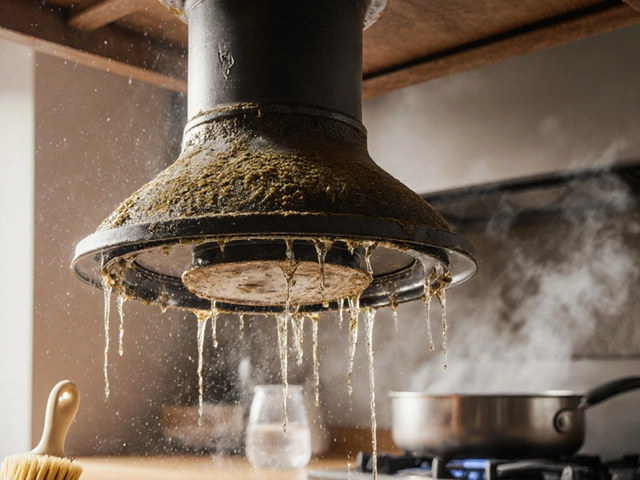Boiler Repair vs Replacement Cost Calculator
This tool helps you decide whether to repair or replace your 20-year-old boiler based on costs and potential savings.
When a boiler that’s been heating your home for two decades starts acting up, the first question is always the same: should I fix it or buy a new one?
Quick Takeaways
- Repairing a 20‑year‑old boiler usually costs 30‑60% of a full replacement.
- Older units are less efficient; a new boiler can cut fuel bills by 15‑30%.
- Safety certifications become mandatory after major work - a new install comes with a fresh gas safety certificate.
- If the heat exchanger is cracked, replacement is often the only safe option.
- Consider the warranty: repairs are covered for 12 months, new boilers often include 5‑year guarantees.
Why 20 Years Matters
Most manufacturers quote a design life of 15‑20 years for residential boilers. After that, metal fatigue, mineral buildup, and outdated controls start to bite. A 20‑year‑old unit is likely running on a technology that predates modern condensing systems, which means it can waste up to a third of the fuel it burns.
That said, age alone isn’t a death sentence. If the unit has been well‑maintained - regular annual service, clean filters, and a recent safety check - it can still have a few years left. The key is to weigh the likely remaining life against the cost of getting it back to a reliable state.
Cost Comparison: Repair vs. Replace
Below is a snapshot of typical numbers you’ll see in the UK market in 2025. Your local rates may differ, but the ratios stay similar.
| Factor | Repair | Replace |
|---|---|---|
| Labor | £150‑£300 | £400‑£600 |
| Parts | £200‑£500 (pump, PCB, sensor) | £1,200‑£2,500 (new unit) |
| Energy Savings (annual) | ~£80‑£120 | ~£250‑£400 |
| Warranty | 12‑month labour guarantee | 5‑year parts & labour |
| Downtime | 1‑2 days | 3‑5 days (including disposal) |
| Environmental Impact | Reuse of existing housing | Reduced carbon emissions by 15‑30% |
If you add up labor and parts, a typical repair lands between £350 and £800. A brand‑new condensing boiler, including installation, usually runs £2,000‑£3,500. The upfront gap looks big, but remember the new unit also brings lower running costs and a longer warranty.
Safety & Regulations
Any work on a gas‑fired boiler must comply with the Gas Safety Certificate requirements. After a major repair, a certified engineer must issue a fresh certificate, proving the system is safe to operate.
One of the most common safety red flags is a cracked heat exchanger. The heat exchanger transfers heat from the combustion gases to the water. When it cracks, carbon monoxide can leak into your home - a silent killer.
If the repair involves replacing the heat exchanger, the cost skews toward the high‑end of the repair range (£500‑£900). In many cases, engineers will recommend a full replacement instead of a costly, temporary fix.
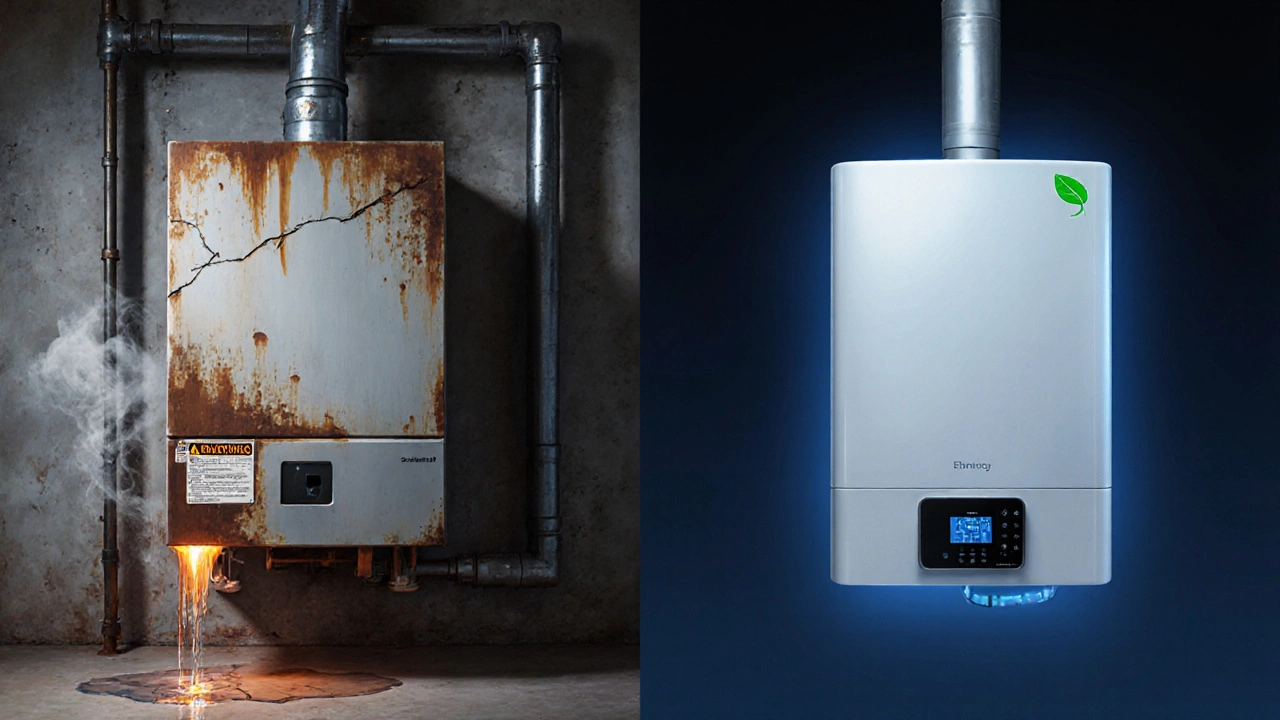
Energy Efficiency and Running Costs
Modern boilers are rated by the Seasonal Efficiency of Domestic Boilers (SEDB), expressed as a percentage. A 20‑year‑old non‑condensing model typically sits at 70‑80% SEDB, meaning 20‑30% of the fuel never becomes heat.
Condensing boilers introduced in the early 2010s regularly hit 90‑95% SEDB. That translates into a noticeable drop in your monthly gas bill. Over a typical 10‑year ownership, you could save £2,500‑£4,000 in fuel costs alone.
Beyond the numbers, a more efficient boiler also reduces your household’s carbon footprint. If you’re aiming for a greener home, a new unit is the clear winner.
Longevity and Warranty
When you buy a new boiler, you get a manufacturer’s warranty that often covers parts and labour for five years. Some brands even offer a ten‑year “no‑leak” guarantee on the heat exchanger.
Repair warranties are much shorter - usually twelve months for the specific work done. If the same component breaks again after that period, you’re back to square one.
Think about the expected remaining life of your current unit. If it’s already 20 years old, you might only squeeze out another 3‑5 years after a repair. In contrast, a new boiler gives you a reliable 15‑20 year window.
Decision Checklist
- Get a detailed quote that breaks down labour, parts, and any required safety certificates.
- Ask the engineer to inspect the heat exchanger and tell you if it’s repairable.
- Calculate your expected annual fuel savings with a newer, higher‑efficiency model.
- Factor in the warranty length you’ll receive for repair versus replacement.
- Consider disposal costs for the old unit - many installers include free removal.
- Check if any government or local grants are available for upgrading to a condensing boiler (e.g., Green Homes Grant).
- Make a simple cost‑benefit chart: total repair cost vs. total replacement cost over the next 5‑10 years.
If the repair cost is less than 60% of a new boiler and the heat exchanger is sound, a fix can be a smart short‑term move. Otherwise, it’s usually cheaper in the long run to replace.
Next Steps & Troubleshooting
**If you decide to repair** - schedule an appointment with a Gas Safe‑registered engineer, request a written estimate, and ask for a post‑repair Gas Safety Certificate. Keep the paperwork for future resale value.
**If you decide to replace** - compare at least three reputable brands, look for the highest SEDB rating, and verify that the installer provides a full warranty package. Ask about a “maintenance plan” that includes an annual service; this keeps the new boiler running efficiently for years.
**If you’re stuck** - run the simple spreadsheet below (feel free to copy into Excel). Input your local gas price per kWh, your estimated annual consumption, and the repair vs. replacement numbers. The spreadsheet will output the break‑even point.
| Variable | Repair | Replace |
|---|---|---|
| Up‑front cost | £650 | £2,800 |
| Annual fuel cost | £1,200 | £950 |
| Annual savings | £0 | £250 |
| Years to breakeven | - | 9.2 |
In this example, the repair pays off quickly if you only need a few more years of heating. If you plan to stay in the house for a decade or more, the replacement starts to look more attractive.
Frequently Asked Questions
How long does a typical boiler repair take?
Most minor repairs - such as fixing a faulty thermostat or replacing a pump - can be completed in a single visit lasting 1‑2 hours. Major work, like a heat‑exchanger replacement, may require two days.
Is a 20‑year‑old boiler safe to keep?
Safety depends on the condition of critical components. If the heat exchanger is intact, the gas valves work, and the system passes a recent Gas Safety Certificate, it can be safe for a few more years. A cracked heat exchanger or repeated leaks make replacement the only safe choice.
Can I claim any rebates for installing a new boiler?
In 2025 the UK government offers the Green Homes Grant for up‑to‑£5,000 on qualifying energy‑efficiency upgrades, including condensing boilers. Check with your local council for eligibility and application deadlines.
What is the typical lifespan of a modern condensing boiler?
When maintained annually, a modern condensing boiler usually lasts 15‑20 years before efficiency drops noticeably.
Should I also replace the radiators when I get a new boiler?
Not necessarily. Radiators are independent of the boiler’s efficiency. However, if the radiators are old, leaky, or unevenly heating rooms, upgrading them can improve overall comfort and make the new boiler’s performance shine.
Bottom line: 20 year old boiler repair can be a cost‑effective stop‑gap if the core components are healthy and you’re looking at just a few more winters. But if you’re planning to stay put, want lower bills, and crave peace of mind, a replacement usually pays off in the long run.
